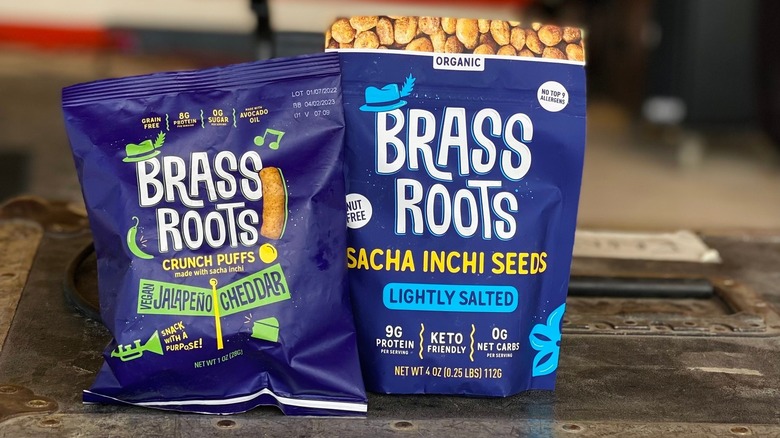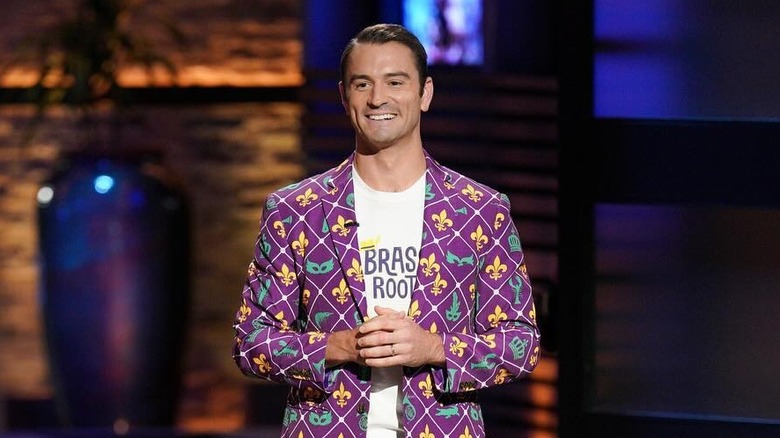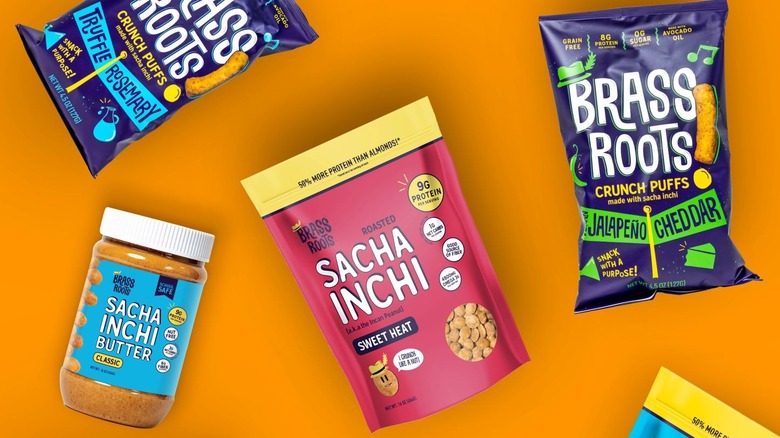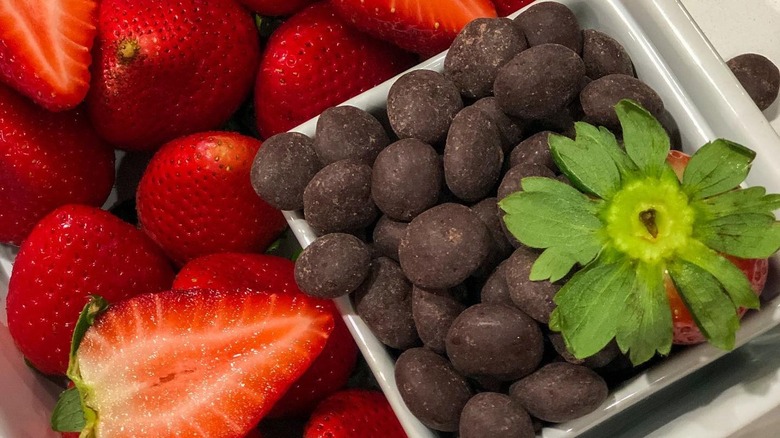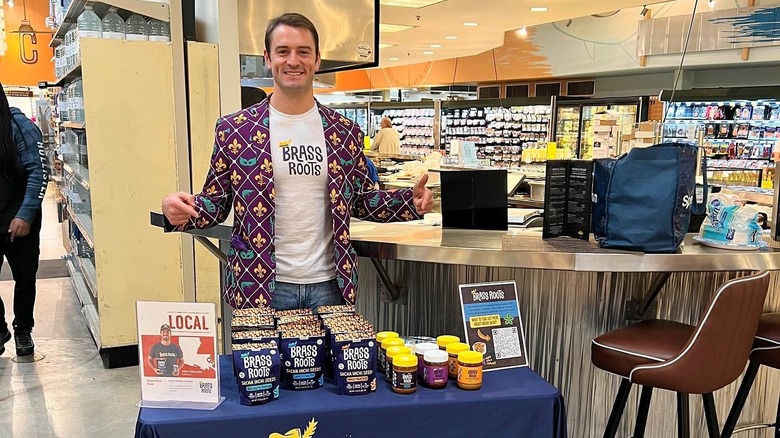Brass Roots: Here's What Happened After Shark Tank
When food company Brass Roots appeared on "Shark Tank," the brand had a two-part mission that was almost too touching to turn down. Founder Aaron Gailmor ran the company out of New Orleans, Louisiana in hopes of providing nutritious, allergen-sensitive snacks and giving back to youth in his community. Along with promoting sacha inchi seed-based snack foods, the company was involved in youth education programs centered around nutrition and music.
Gailmor was jazzed and ready to get the Sharks singing the Brass Roots tune on Episode 12, Season 14 of the show, which aired in January of 2023. He entered the Tank with an original theme song accompanied by two brass musicians. After the entrepreneur tossed some Mardi Gras beads to Mark Cuban, Lori Greiner, Daymond John, Kevin O'Leary, and guest Shark Daniel Lubetzky, he got right into the pitch — which was punctuated by trumpet sound effects to set the tone.
Gailmor positioned Brass Roots products as satisfying, healthy, and sustainable snacks made of the sacha inchi seed. Native to South America and the Caribbean, this seed is most commonly consumed in Peru, and is also known as the Inca nut, named for one of the indigenous peoples from the area. The seeds are incredibly nutritionally dense: A 10-gram serving has three grams of protein and one gram of fiber (via Healthline). They have a crunchy texture remarkably similar to peanuts or almonds, but are safe for people with peanut or tree nut allergies.
What happened to Brass Roots on Shark Tank?
Aaron Gailmor asked the Sharks for $400,000 in exchange for 7% equity. To bolster his pitch, he offered samples of the brand's roasted sacha inchi seeds; savory "puff" snacks; a sacha inchi butter and jelly sandwich; and a chocolate chip bar. Gailmor has a background in business, but dove into the nutrition sector after his father was diagnosed with heart disease. He was also coming off of an unsuccessful venture called Super Eats that made kale-based tortilla chips.
When asked by Kevin O'Leary to justify the substantial investment, the sales numbers sounded promising. Revenues were projected to reach $1.5 million in the fourth year. The company's first year only saw $35,000 in sales, so clearly there was demonstrated growth. However, Brass Roots was still not turning a profit. With a loss of around $30,000 per month and slim reserves, the company was actually in quite a precarious situation financially.
O'Leary tapped out once Gailmor revealed that he rolled over the equity from the previous investors in the failed kale chip deal, so he now owned only 33% of the company. Mark Cuban felt that the company was in too challenging of a place, and Daymond John said "I'm out" for similar reasons. Lori Greiner said educating consumers about what the sacha inchi seed is was too great a hurdle, and despite also being a fan of the product, Daniel Lubetsky could not comfortably invest due to its financial situation.
Brass Roots after Shark Tank
Despite walking away without a deal, Aaron Gailmor still felt positive about his endeavors. He truly believed in his products and said that he was personally seeing a tremendous amount of interest in the sacha inchi seed. And just because the Sharks did not make an investment doesn't mean Brass Roots saw no benefits. As with many other healthy snacks that have appeared on "Shark Tank," such as P-Nuff Crunch, Bohana, and Snacklins, viewers were eager to take a bite. Brass Roots saw around 10,000 orders after the episode aired.
In a video post on LinkedIn, Gailmor also spoke to the key takeaways from his visit to "Shark Tank." Mark Cuban mentioned making packaging more educational for the consumer; Daniel Lubetzky suggested focusing on only the highest-selling product lines; and Kevin O'Leary talked about leveraging capital in the most optimal manner. This feedback has directly impacted changes within the company, notes Gailmor, and packaging is a clear example. Aesthetic changes have put the sacha inchi seed front and center, with large lettering and a clear "window" to view the product. It also includes a bit more information that is helpful to consumers who may not be familiar with the ingredient.
Is Brass Roots still in business?
Unlike some unlucky "Shark Tank" hopefuls, Brass Roots hasn't gone under. Its website, Facebook, and Instagram are all active. It appears that Aaron Gailmor took Daniel Lubetsky's advice about streamlining product offerings. The focus of Brass Roots has shifted to just the roasted seeds and sacha inchi butter, and granola bars and puffed snacks are no longer available. The whole seeds are available in 1.75-, 12-, and 16-ounce bags in flavors including lightly salted, salt and vinegar, sweet heat, ranch, cinnamon crunch, dark chocolate, and honey mustard. The seed butters are available in classic, unsweetened, and chocolate varieties.
At the time Brass Roots appeared on "Shark Tank," larger bags of the seeds were manufactured at a cost of about $5, and sold for $18. When questioned about the high retail price, Gailmor said that his products were still less expensive than organic almonds. Today, Brass Roots' prices have gone up a bit, but it also sells snack-sized bags that cost much less. Currently, 16-ounce jars of its sacha inchi seed butter are priced between $18 and $19.
You can buy these products through the brand's website and Amazon, as well as stores like Erewhon, Whole Foods, and Sprouts. A $1 million investment from John B. Sanfilippo & Son, Inc. (JBSS) made this kind of retail growth possible. JBSS focuses on nuts and snacks, so it was an ideal partner to support Brass Roots' expansion.
What is next for Brass Roots?
Brass Roots continues to focus on reach. In a post on LinkedIn, Aaron Gailmor discussed expanding Brass Roots' retail presence, but not necessarily through the traditional channels. Instead, the company is targeting smaller shops and distributors that could move the product into places like cafés and offices. Gailmor regularly goes to trade shows and promotional events representing Brass Roots, and he often mans the booth sporting the same bright purple, fleur de lis-covered suit that he wore during his "Shark Tank" appearance.
On Amazon, reviews for the brand's products range from three to four stars. Many adore the unique taste and texture of the seeds, the fun flavors, and the nutritional benefits. Most of the more critical reviews cite an overly earthy flavor, high prices, and packaging issues. Fans of the brand's crunch puffs continue to interact with social media posts asking when they might return. It seems that Brass Roots has converted enough healthy snackers to the sacha inchi bandwagon to keep the business going.

